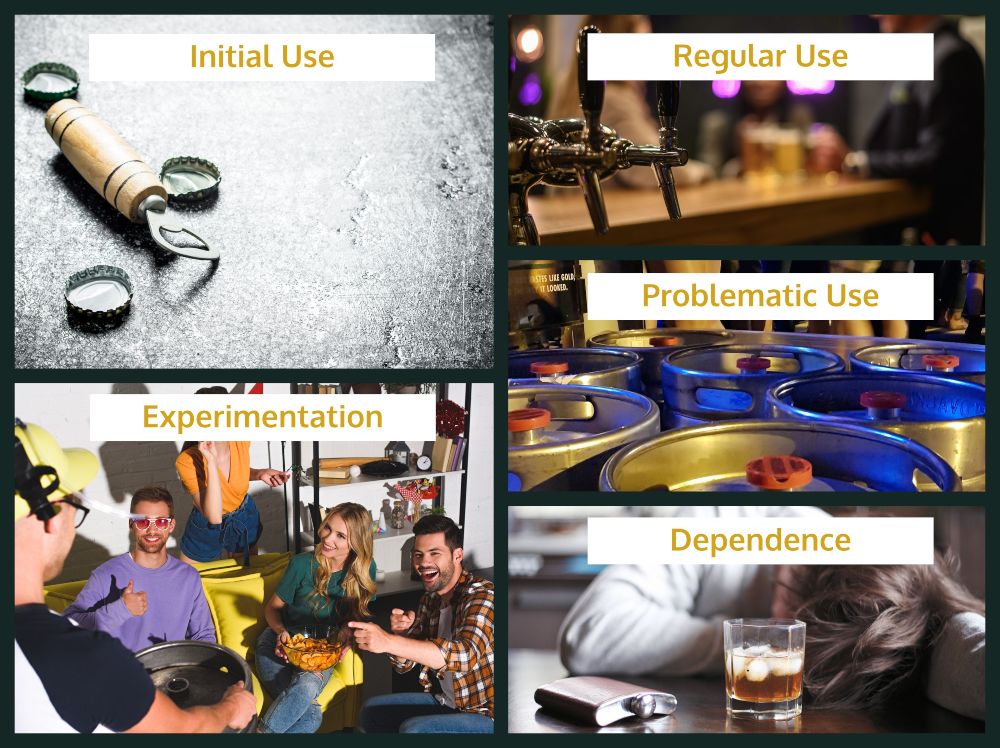
24 Oct The Stages of Addiction
Over 20 million people suffer from a substance disorder in the United States. Addiction is a complex, chronic brain disease that develops over time, impacting every aspect of a person’s quality of life. Addiction, also called substance use disorder, occurs in stages, from initial use to dependence.
Risk factors include a family history of addiction, behavioral health disorders, peer pressure, and physical or psychological abuse. Depression, loneliness, neglect, and a person’s environment also play pivotal roles in whether someone is at higher risk for developing an addiction. A person may also be genetically predisposed to addictive behavior whether or not there is a family history.
These risk factors alone don’t guarantee that a person will become an addict. The societal and personal issues accompanying these risk factors within each stage of addiction also contribute to that risk.
What are the Stages of Addiction?
Many factors contribute to addiction’s progression. The person’s psychological and biological make-up, as well as their environment, make every path to addiction a unique journey. And unfortunately, every journey to addiction begins with that first use.
Initial Use
One use may be all it takes to create that cycle of addiction. Especially if the person is using powerful illicit drugs like methamphetamine or heroin. Most addiction, however, develops over time and with repeated substance usage.
Most initial substance use happens while with other people. It may be at a family gathering or a party with friends. Alcohol and drug use may seem harmless at this first stage. However, for some people, that first use leads to a need for experimentation.
Experimentation
The experimentation stage usually does not lead to psychological or biological dependence. If the initial use of alcohol or drugs leaves a person with pleasurable feelings, that person may want to replicate those feelings. They may experiment with more of the same substance or by varying drug or alcohol usage.
Some Reasons for Experimentation
• Social acceptance
• Peer pressure
• Substance enjoyment
Some Consequences of Experimentation
• Irregular usage at this stage
• May lead to regular usage
Experimentation is voluntary, often out of curiosity. It does not necessarily lead to regular or problematic use or dependence. However, for some people, experimenting with substance use becomes challenging to control, leading to everyday use. Examples of common drugs that people experiment with are alcohol, marijuana, opioids, benzos, and heroin.
Regular Use
Experimentation often leads to substance use, either socially or alone. Many times the user will begin to use it regularly to cope with personal problems. They may want to “lose themselves” for a while within the effects of the alcohol or drug.
The person may use drugs or alcohol regularly to trigger a feel-good response in their brain. Repeated substance use over time may lead to tolerance, meaning that the brain is used to the substance’s effects upon it.
Some Reasons for Regular Use
• Perceived need for the substance to help lessen the physical pain
• Social anxiety and peer pressure to use alcohol or drugs repeatedly
Some Consequences of Regular Use
• Daily need for a substance
• The person has developed a tolerance to a certain substance
Not everyone who socially uses drugs or alcohol will develop a regular routine of substance use. Everyday use, however, can lead to social isolation and relationship issues.
Problematic Use
It can be challenging to discern between regular substance use and problematic use. Often what begins as everyday social use turns into substance use while alone. Some people may even hide their alcohol or drug use from others.
Some Reasons for Problematic Use
• Tolerance of substance use leads to brain receptors adjusting to the presence of alcohol or drugs.
• Feelings that a person cannot “get through the day” without the substance use
Some Consequences of Problematic Use
• Relationship stress
• Spousal stress
• Issues with work responsibilities
Regular use can lead to problematic substance use, which can lead to dependence. Problematic usage interrupts the person’s quality of life to the point that it is difficult to function.
Dependence
Medically-defined addiction begins at the dependence stage. However, it is essential to recognize that not all types of drug dependence are an addiction. Many rely on medications such as anti-depressants to control disease or certain psychological disorders without being addicted to their usage.
It can be challenging to discern whether someone has a substance use disorder. Some signs may be present that may make any suspicion of substance use disorder clear.
Recognizing a Substance Use Disorder
There is a difference between drug abuse and drug addiction. The Diagnostic and Statistical Manual of Mental Disorders (DSM-5) uses the term substance use disorder as the diagnostic umbrella for addiction. The diagnosis is further broken down into mild, moderate, or severe categories. The level of addiction is dependent on the physical and psychological impairments accompanying the disorder over 12 months.
Signs that someone may suffer from a substance use disorder include:
• Changes in behavior, such as isolation, secrecy, anger, sadness, and mood swings
• No motivation or energy to keep up with usual routines
• Sudden disinterest in school, work, or family
• Missing school or work frequently
• School of work performance suffers
• Unusual, sudden, or unreasonable requests for money
• Stealing money or items around the house
• Self-neglect, such as no interest in grooming, looks, or clothing
• Physical health issues like weight fluctuation
This isn’t an all-inclusive list. Some addicts, like alcoholics, function very well in school and on the job. Therefore, making it difficult to recognize when people need intervention and treatment.
Getting Treatment
Addicts may die without intervention without treatment. Most – 9 out of 10 people – do not receive treatment for their addiction. Substance use disorders consume people’s time, zap their energy, and devour resources and relationships.
Treatment Options
Various treatment options are available, and insurance may cover treatment whether you are an inpatient or an outpatient treatment.
• Detox
• Medication-assisted treatment
• Cognitive and behavioral therapy
• Counseling and Aftercare
Persons in the throes of addiction must get treatment and intervention as early as possible. This way, they can regain control over their lives and their physical and psychological well-being.
Combining detoxification, medical withdrawal, and cognitive and behavioral therapies is a first-line defense that most treatment programs find successful. Continuing counsel and family support are also crucial to prevent relapse. Recognizing addiction’s progression from first use to dependence is essential to getting care as soon as possible.
Get Help Today
If you or a loved one is struggling with addiction, treatment options are available. New Method Wellness is a treatment center in Southern California specializing in treating substance use disorders.
Our highly-skilled team of treatment professionals is here to help those struggling build a foundation in recovery. We use evidence-based treatments to help people heal their mental and behavioral health. Our comprehensive approach to treating addiction helps our clients find long-term sobriety and recovery.
Contact us today to learn more about our program options and how we can help.








